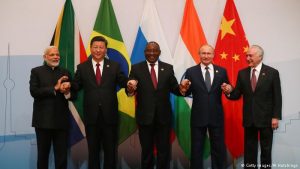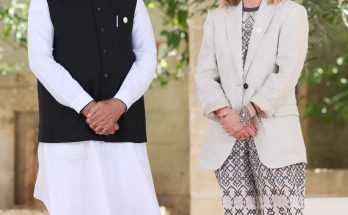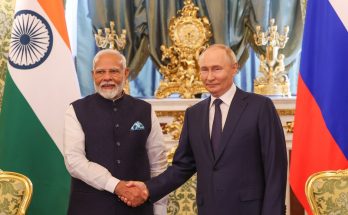
JOHANNESBURG: On a crisp sunny winter day in the land of Madiba, the leaders of BRICS countries decided to build a new edifice of reformed multilateral order as a bulwark against rising ties of unilateralism and parochialism and forged a network to leverage the 4th Industrial Revolution for people of the global South.
The major takeaway of the 10th BRICS summit in Johannesburg was the solidification of the BRICS’ stature as the voice of moderation, stability and balance amid capricious unilateralism epitomised in President Donald Trump’s repeated assaults on the liberal trading order.
The BRICS solidarity stood out even as other older multilateral groupings led by the West, including G7 and NATO are showing signs of fissures and dissonance.
In his remarks at the summit, India’s Prime Minister Narendra Modi unveiled his vision of reformed multilateralism and urged his counterparts from other emerging economies to advance a just, open and transparent international system. The objective of this reformed multilateralism is not to preserve the status quo, but to reform the world order and global governance architecture, said Mr T.S. Tirumurthi, Secretary (Economic Relations) in India’s external affairs ministry and New Delhi’s Sherpa for the BRICS summit.
“We reiterate our determination to work together to strengthen multilateralism and the rule of law in international relations, and to promote a fair, just, equitable, democratic and representative international order,” said the Johannesburg Declaration.
In a similar vein, Chinese President Xi Jinping pitched for a new type of international relations. “We need to out forward solutions to the world’s conflicts and forge a new type of international relations,” said Mr Xi.
In sync with the theme of the 10th BRICS summit, Mr Modi also stressed on tech-driven inclusive growth and transformation. Technology and digital interface presented a host of opportunities and challenges, he said.
Russian President Vladimir Putin underscored the imperative of enhanced intra-BRICS cooperation in the digital economy. “The digital realities call for greater safety and security of business and citizens, safe and reliable internet and the protection of personal data,” said Mr Putin.
Enhancing intra-BRICS counter-terror cooperation figured prominently in the Johannesburg Declaration.
Widening the arc of BRICS agenda, the 10th summit has fleshed out modalities of enhanced intra-BRICS cooperation in combating corruption.
“We commit to strengthening international cooperation within the context of the BRICS Working Group on Anticorruption Cooperation,” said the Johannesburg Declaration.
“Subject to our domestic legal systems we will cooperate in anti-corruption law enforcement, extradition of fugitives, economic and corruption offenders and repatriation in matters relating to assets recovery and other related criminal and non-criminal matters involving corruption and call on the International community to deny safe haven to corrupt persons and proceeds of corruption,” it said.
Going forward, the 10th summit in Johannesburg has set the stage for a more robust role for the BRICS in shaping the global agenda and global governance architecture to reflect aspirations of the global South.
Author Profile

- Manish Chand is Founder-CEO and Editor-in-Chief of India Writes Network (www.indiawrites.org) and India and World, a pioneering magazine focused on international affairs. He is CEO/Director of TGII Media Private Limited, an India-based media, publishing, research and consultancy company.
Latest entries
 India and the WorldJuly 9, 2024Defying West, India sets $100 billion trade target with Russia
India and the WorldJuly 9, 2024Defying West, India sets $100 billion trade target with Russia India and the WorldJuly 5, 2024India at SCO: Takes swipe at Pakistan for cross-border terror, pushes alternative to BRI
India and the WorldJuly 5, 2024India at SCO: Takes swipe at Pakistan for cross-border terror, pushes alternative to BRI India and the WorldJune 14, 2024Modi’s Day 1 in Italy: Bonding with Britain, France
India and the WorldJune 14, 2024Modi’s Day 1 in Italy: Bonding with Britain, France India and the WorldJune 13, 2024G7 summit in Italy: Modi to showcase India as leader of Global South
India and the WorldJune 13, 2024G7 summit in Italy: Modi to showcase India as leader of Global South






